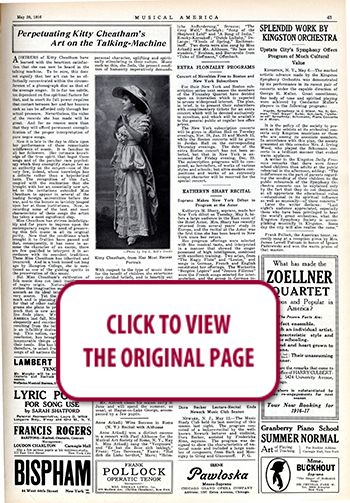 100 YEARS AGO IN MUSICAL AMERICA (144)
100 YEARS AGO IN MUSICAL AMERICA (144)
May 20, 1916
Page 43
Perpetuating Kitty Cheatham’s Art on the Talking=Machine
ADMIRERS of Kitty Cheatham have learned with the heartiest satisfaction that she can now be heard in the talking machine. To be sure, this does not signify that her art can be as effectually concentrated within the circumference of a phonograph disc as that of the average singer. It is far too subtle, too dependent on fine spiritual factors for that, and to exert its full power requires that contact between her and her hearers such as can be afforded only through her actual presence. Nevertheless, the value of the records she has made will be great. And for no reason more than that they will afford permanent exemplification of the proper interpretation of pure Negro songs.
Now it is late in the day to dilate upon her performance of these remarkable wildflowers of music. It is familiar to all her followers. Her intimate knowledge of the true spirit that begot these songs and of the peculiar race psychology which they exemplify stamps her as an authority on the subject—one of the very few, indeed, whose knowledge has a definite rather than a hypothetical basis. The recognition of this fact, coupled with the realization that she brought with her an essentially new art, led to the invitations extended Miss Cheatham to appear in several of the leading foreign universities before the war, and to the honors so lavishly heaped upon her at those institutions. Now, in recording some of the best and most characteristic of these songs the artist has taken a most significant step.
Miss Cheatham has striven indefatigably and for years to impress upon the contemporary Negro the need of preserving this folk music in all its original purity. Now that the conditions which brought it to fruition have passed and that, consequently, it has come to assume the character of an exotic, there are few qualified to interpret it in accordance with its soundest traditions. These Miss Cheatham has inherited and treasured. And in a book issued not long ago by Hampton College, she is mentioned as one of the guiding spirits in the preservation of this music.
But Miss Cheatham’s cultivation of folk music does not limit itself to that of Negro origin. Naturally this last strikes the imagination most forcibly, inasmuch as its ideal interpreters are so very scarce. Yet the artist has done much and is planning to do even more for that of other nations. On the programs she plans to present next season much that is new and original in this line finds place. Writing in MUSICAL AMERICA last fall, Miss Cheatham spoke eloquently and convincingly of the harm resulting from the belief that folk-song is an infallibly desirable musical offering. This notion, carried to its logical conclusion, has brought before children innumerable things utterly unsuited to their needs. She has labored ceaselessly, therefore, to select from among the folksongs of all nations those of a purely impersonal character, uplifting and spiritually stimulating in their nature. Music such as this, she feels, the present condition of humanity imperatively demands. W
ith respect to the type of music done for the benefit of children she entertains very decided beliefs, and is heartily out of favor with much that is set before them to-day. The works she is industriously compiling to-day will unquestionably fill the mental and spiritual needs of the young as could nothing else. —H.F. P.




 RENT A PHOTO
RENT A PHOTO





